Pearson BTEC HND Travel and Tourism: Legislation and Ethics Report
VerifiedAdded on 2020/11/23
|15
|4496
|257
Report
AI Summary
This report delves into the legal and regulatory framework of the travel and tourism sector, focusing on surface, sea, and air transport laws within the UK. It evaluates the impact of health, safety, and security legislation, as well as laws pertaining to equality. The report also explores contract and consumer protection legislation, highlighting customer rights. Furthermore, it addresses ethical dilemmas faced by the industry and analyzes the corporate social responsibility policy of the International Airline Group. The report covers various aspects, including tourism legislation, transport acts, health and safety regulations, equality rights, and contract laws, providing a comprehensive overview of the legal and ethical considerations in the travel and tourism sector. The report also encompasses the legal and ethical dimensions of the travel and tourism industry.

LETTS
1
1
Paraphrase This Document
Need a fresh take? Get an instant paraphrase of this document with our AI Paraphraser
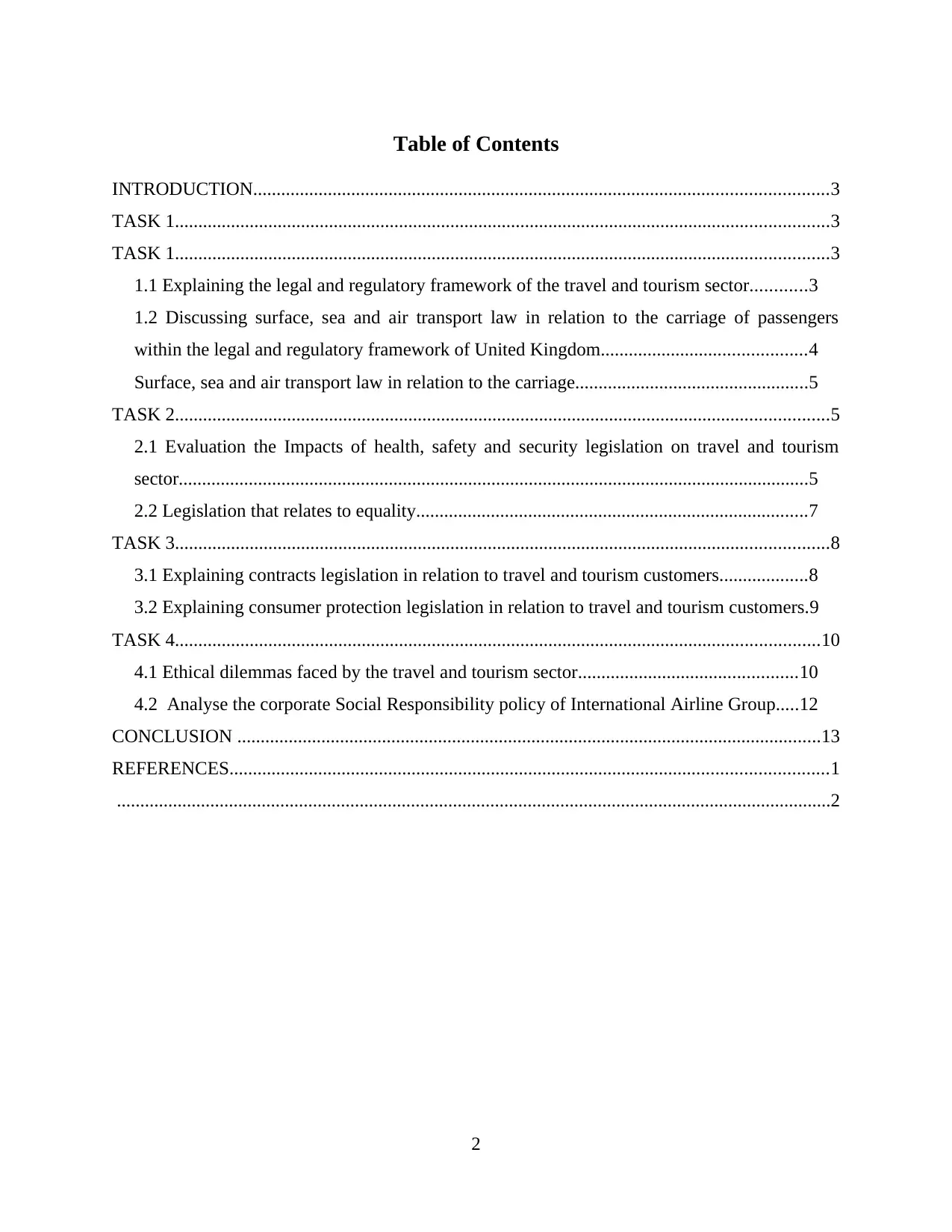
Table of Contents
INTRODUCTION...........................................................................................................................3
TASK 1............................................................................................................................................3
TASK 1............................................................................................................................................3
1.1 Explaining the legal and regulatory framework of the travel and tourism sector............3
1.2 Discussing surface, sea and air transport law in relation to the carriage of passengers
within the legal and regulatory framework of United Kingdom............................................4
Surface, sea and air transport law in relation to the carriage..................................................5
TASK 2............................................................................................................................................5
2.1 Evaluation the Impacts of health, safety and security legislation on travel and tourism
sector.......................................................................................................................................5
2.2 Legislation that relates to equality....................................................................................7
TASK 3............................................................................................................................................8
3.1 Explaining contracts legislation in relation to travel and tourism customers...................8
3.2 Explaining consumer protection legislation in relation to travel and tourism customers.9
TASK 4..........................................................................................................................................10
4.1 Ethical dilemmas faced by the travel and tourism sector...............................................10
4.2 Analyse the corporate Social Responsibility policy of International Airline Group.....12
CONCLUSION .............................................................................................................................13
REFERENCES................................................................................................................................1
.........................................................................................................................................................2
2
INTRODUCTION...........................................................................................................................3
TASK 1............................................................................................................................................3
TASK 1............................................................................................................................................3
1.1 Explaining the legal and regulatory framework of the travel and tourism sector............3
1.2 Discussing surface, sea and air transport law in relation to the carriage of passengers
within the legal and regulatory framework of United Kingdom............................................4
Surface, sea and air transport law in relation to the carriage..................................................5
TASK 2............................................................................................................................................5
2.1 Evaluation the Impacts of health, safety and security legislation on travel and tourism
sector.......................................................................................................................................5
2.2 Legislation that relates to equality....................................................................................7
TASK 3............................................................................................................................................8
3.1 Explaining contracts legislation in relation to travel and tourism customers...................8
3.2 Explaining consumer protection legislation in relation to travel and tourism customers.9
TASK 4..........................................................................................................................................10
4.1 Ethical dilemmas faced by the travel and tourism sector...............................................10
4.2 Analyse the corporate Social Responsibility policy of International Airline Group.....12
CONCLUSION .............................................................................................................................13
REFERENCES................................................................................................................................1
.........................................................................................................................................................2
2
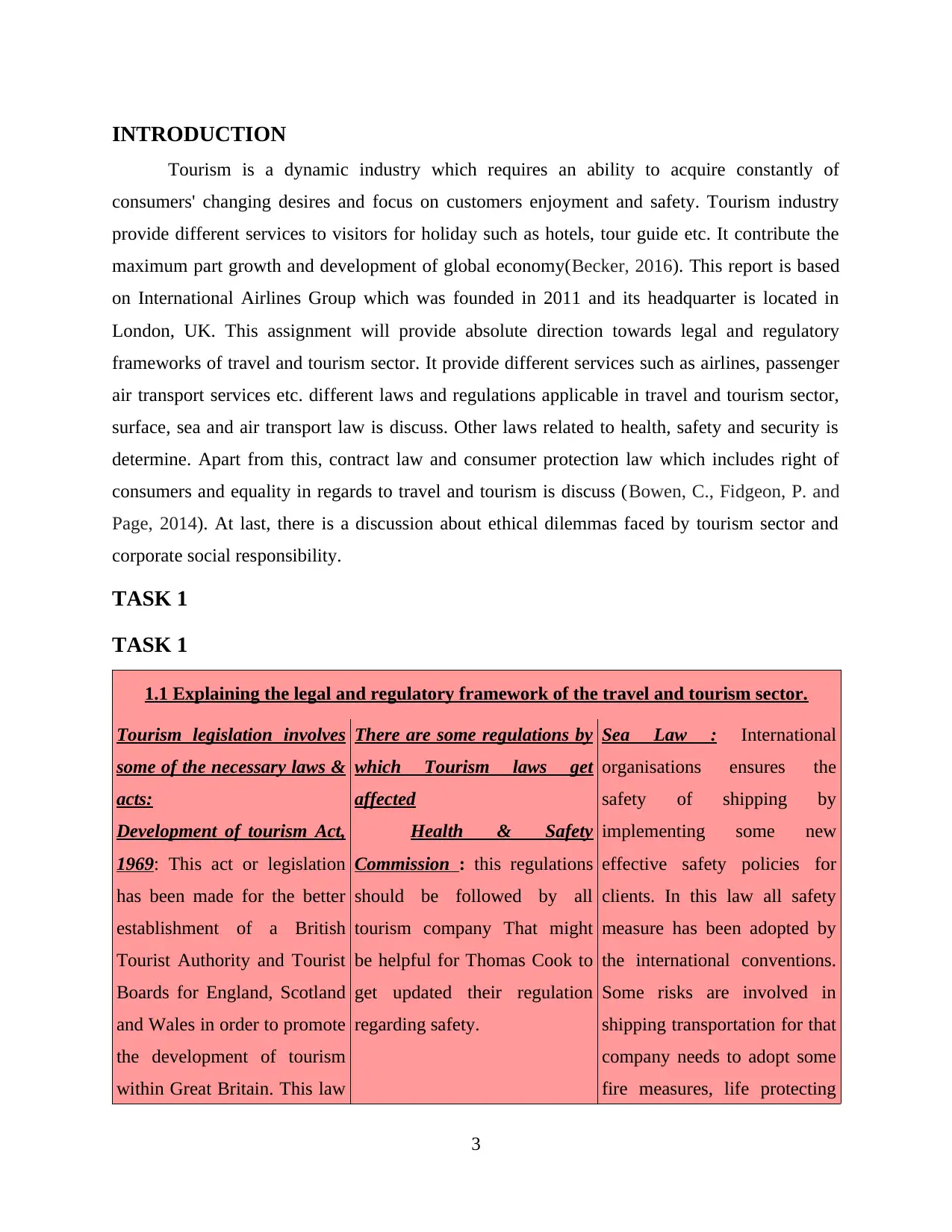
INTRODUCTION
Tourism is a dynamic industry which requires an ability to acquire constantly of
consumers' changing desires and focus on customers enjoyment and safety. Tourism industry
provide different services to visitors for holiday such as hotels, tour guide etc. It contribute the
maximum part growth and development of global economy(Becker, 2016). This report is based
on International Airlines Group which was founded in 2011 and its headquarter is located in
London, UK. This assignment will provide absolute direction towards legal and regulatory
frameworks of travel and tourism sector. It provide different services such as airlines, passenger
air transport services etc. different laws and regulations applicable in travel and tourism sector,
surface, sea and air transport law is discuss. Other laws related to health, safety and security is
determine. Apart from this, contract law and consumer protection law which includes right of
consumers and equality in regards to travel and tourism is discuss (Bowen, C., Fidgeon, P. and
Page, 2014). At last, there is a discussion about ethical dilemmas faced by tourism sector and
corporate social responsibility.
TASK 1
TASK 1
1.1 Explaining the legal and regulatory framework of the travel and tourism sector.
Tourism legislation involves
some of the necessary laws &
acts:
Development of tourism Act,
1969: This act or legislation
has been made for the better
establishment of a British
Tourist Authority and Tourist
Boards for England, Scotland
and Wales in order to promote
the development of tourism
within Great Britain. This law
There are some regulations by
which Tourism laws get
affected
Health & Safety
Commission : this regulations
should be followed by all
tourism company That might
be helpful for Thomas Cook to
get updated their regulation
regarding safety.
Sea Law : International
organisations ensures the
safety of shipping by
implementing some new
effective safety policies for
clients. In this law all safety
measure has been adopted by
the international conventions.
Some risks are involved in
shipping transportation for that
company needs to adopt some
fire measures, life protecting
3
Tourism is a dynamic industry which requires an ability to acquire constantly of
consumers' changing desires and focus on customers enjoyment and safety. Tourism industry
provide different services to visitors for holiday such as hotels, tour guide etc. It contribute the
maximum part growth and development of global economy(Becker, 2016). This report is based
on International Airlines Group which was founded in 2011 and its headquarter is located in
London, UK. This assignment will provide absolute direction towards legal and regulatory
frameworks of travel and tourism sector. It provide different services such as airlines, passenger
air transport services etc. different laws and regulations applicable in travel and tourism sector,
surface, sea and air transport law is discuss. Other laws related to health, safety and security is
determine. Apart from this, contract law and consumer protection law which includes right of
consumers and equality in regards to travel and tourism is discuss (Bowen, C., Fidgeon, P. and
Page, 2014). At last, there is a discussion about ethical dilemmas faced by tourism sector and
corporate social responsibility.
TASK 1
TASK 1
1.1 Explaining the legal and regulatory framework of the travel and tourism sector.
Tourism legislation involves
some of the necessary laws &
acts:
Development of tourism Act,
1969: This act or legislation
has been made for the better
establishment of a British
Tourist Authority and Tourist
Boards for England, Scotland
and Wales in order to promote
the development of tourism
within Great Britain. This law
There are some regulations by
which Tourism laws get
affected
Health & Safety
Commission : this regulations
should be followed by all
tourism company That might
be helpful for Thomas Cook to
get updated their regulation
regarding safety.
Sea Law : International
organisations ensures the
safety of shipping by
implementing some new
effective safety policies for
clients. In this law all safety
measure has been adopted by
the international conventions.
Some risks are involved in
shipping transportation for that
company needs to adopt some
fire measures, life protecting
3
⊘ This is a preview!⊘
Do you want full access?
Subscribe today to unlock all pages.

Trusted by 1+ million students worldwide
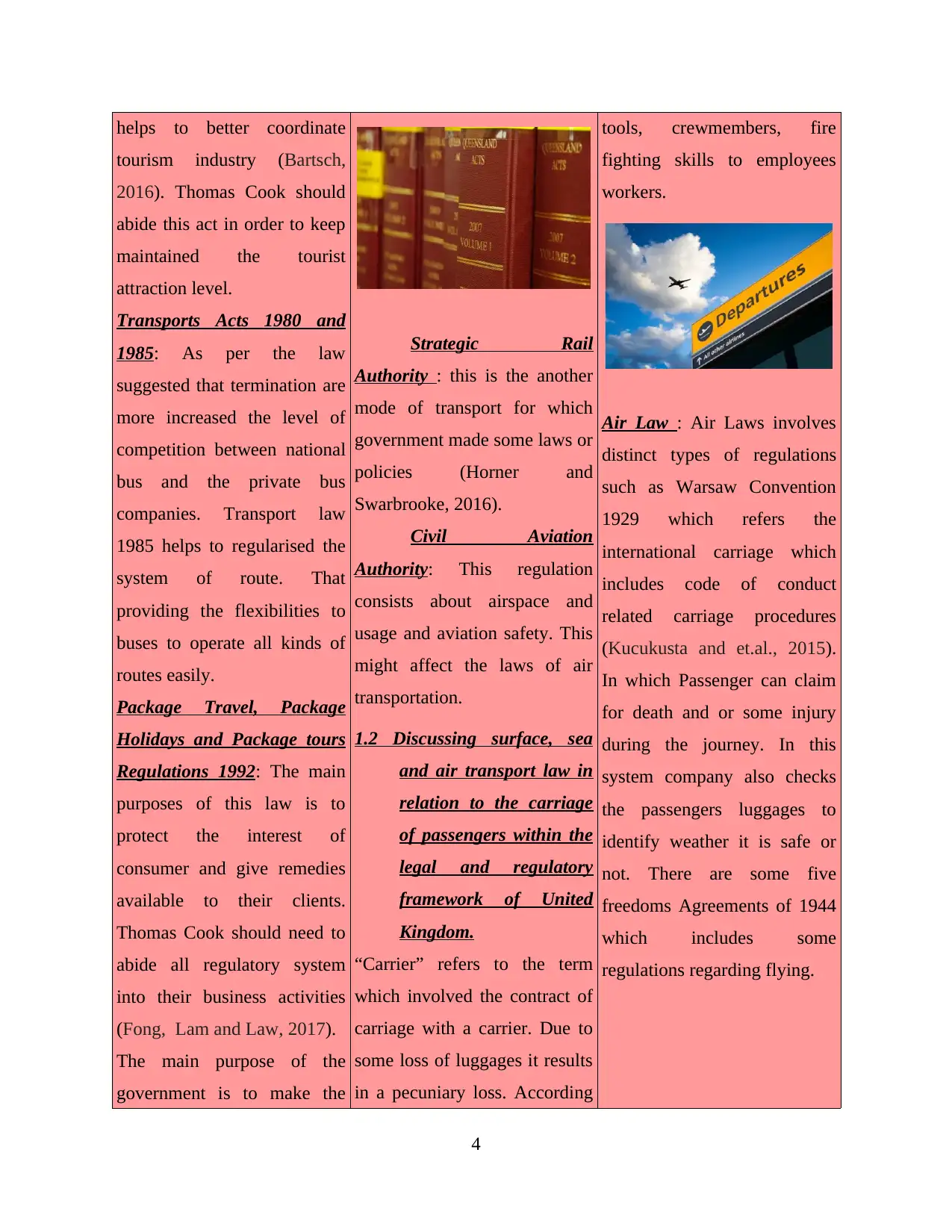
helps to better coordinate
tourism industry (Bartsch,
2016). Thomas Cook should
abide this act in order to keep
maintained the tourist
attraction level.
Transports Acts 1980 and
1985: As per the law
suggested that termination are
more increased the level of
competition between national
bus and the private bus
companies. Transport law
1985 helps to regularised the
system of route. That
providing the flexibilities to
buses to operate all kinds of
routes easily.
Package Travel, Package
Holidays and Package tours
Regulations 1992: The main
purposes of this law is to
protect the interest of
consumer and give remedies
available to their clients.
Thomas Cook should need to
abide all regulatory system
into their business activities
(Fong, Lam and Law, 2017).
The main purpose of the
government is to make the
Strategic Rail
Authority : this is the another
mode of transport for which
government made some laws or
policies (Horner and
Swarbrooke, 2016).
Civil Aviation
Authority: This regulation
consists about airspace and
usage and aviation safety. This
might affect the laws of air
transportation.
1.2 Discussing surface, sea
and air transport law in
relation to the carriage
of passengers within the
legal and regulatory
framework of United
Kingdom.
“Carrier” refers to the term
which involved the contract of
carriage with a carrier. Due to
some loss of luggages it results
in a pecuniary loss. According
tools, crewmembers, fire
fighting skills to employees
workers.
Air Law : Air Laws involves
distinct types of regulations
such as Warsaw Convention
1929 which refers the
international carriage which
includes code of conduct
related carriage procedures
(Kucukusta and et.al., 2015).
In which Passenger can claim
for death and or some injury
during the journey. In this
system company also checks
the passengers luggages to
identify weather it is safe or
not. There are some five
freedoms Agreements of 1944
which includes some
regulations regarding flying.
4
tourism industry (Bartsch,
2016). Thomas Cook should
abide this act in order to keep
maintained the tourist
attraction level.
Transports Acts 1980 and
1985: As per the law
suggested that termination are
more increased the level of
competition between national
bus and the private bus
companies. Transport law
1985 helps to regularised the
system of route. That
providing the flexibilities to
buses to operate all kinds of
routes easily.
Package Travel, Package
Holidays and Package tours
Regulations 1992: The main
purposes of this law is to
protect the interest of
consumer and give remedies
available to their clients.
Thomas Cook should need to
abide all regulatory system
into their business activities
(Fong, Lam and Law, 2017).
The main purpose of the
government is to make the
Strategic Rail
Authority : this is the another
mode of transport for which
government made some laws or
policies (Horner and
Swarbrooke, 2016).
Civil Aviation
Authority: This regulation
consists about airspace and
usage and aviation safety. This
might affect the laws of air
transportation.
1.2 Discussing surface, sea
and air transport law in
relation to the carriage
of passengers within the
legal and regulatory
framework of United
Kingdom.
“Carrier” refers to the term
which involved the contract of
carriage with a carrier. Due to
some loss of luggages it results
in a pecuniary loss. According
tools, crewmembers, fire
fighting skills to employees
workers.
Air Law : Air Laws involves
distinct types of regulations
such as Warsaw Convention
1929 which refers the
international carriage which
includes code of conduct
related carriage procedures
(Kucukusta and et.al., 2015).
In which Passenger can claim
for death and or some injury
during the journey. In this
system company also checks
the passengers luggages to
identify weather it is safe or
not. There are some five
freedoms Agreements of 1944
which includes some
regulations regarding flying.
4
Paraphrase This Document
Need a fresh take? Get an instant paraphrase of this document with our AI Paraphraser
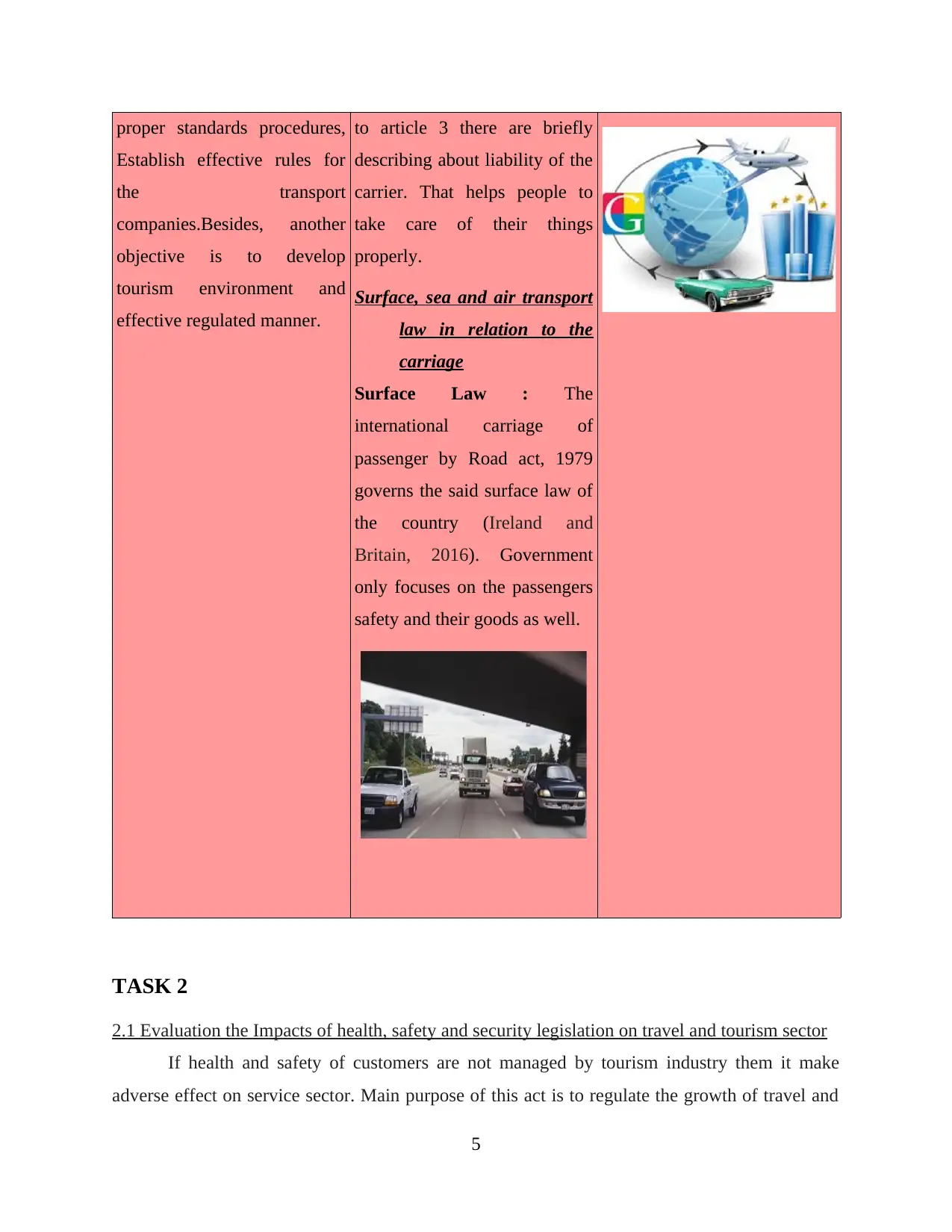
proper standards procedures,
Establish effective rules for
the transport
companies.Besides, another
objective is to develop
tourism environment and
effective regulated manner.
to article 3 there are briefly
describing about liability of the
carrier. That helps people to
take care of their things
properly.
Surface, sea and air transport
law in relation to the
carriage
Surface Law : The
international carriage of
passenger by Road act, 1979
governs the said surface law of
the country (Ireland and
Britain, 2016). Government
only focuses on the passengers
safety and their goods as well.
TASK 2
2.1 Evaluation the Impacts of health, safety and security legislation on travel and tourism sector
If health and safety of customers are not managed by tourism industry them it make
adverse effect on service sector. Main purpose of this act is to regulate the growth of travel and
5
Establish effective rules for
the transport
companies.Besides, another
objective is to develop
tourism environment and
effective regulated manner.
to article 3 there are briefly
describing about liability of the
carrier. That helps people to
take care of their things
properly.
Surface, sea and air transport
law in relation to the
carriage
Surface Law : The
international carriage of
passenger by Road act, 1979
governs the said surface law of
the country (Ireland and
Britain, 2016). Government
only focuses on the passengers
safety and their goods as well.
TASK 2
2.1 Evaluation the Impacts of health, safety and security legislation on travel and tourism sector
If health and safety of customers are not managed by tourism industry them it make
adverse effect on service sector. Main purpose of this act is to regulate the growth of travel and
5
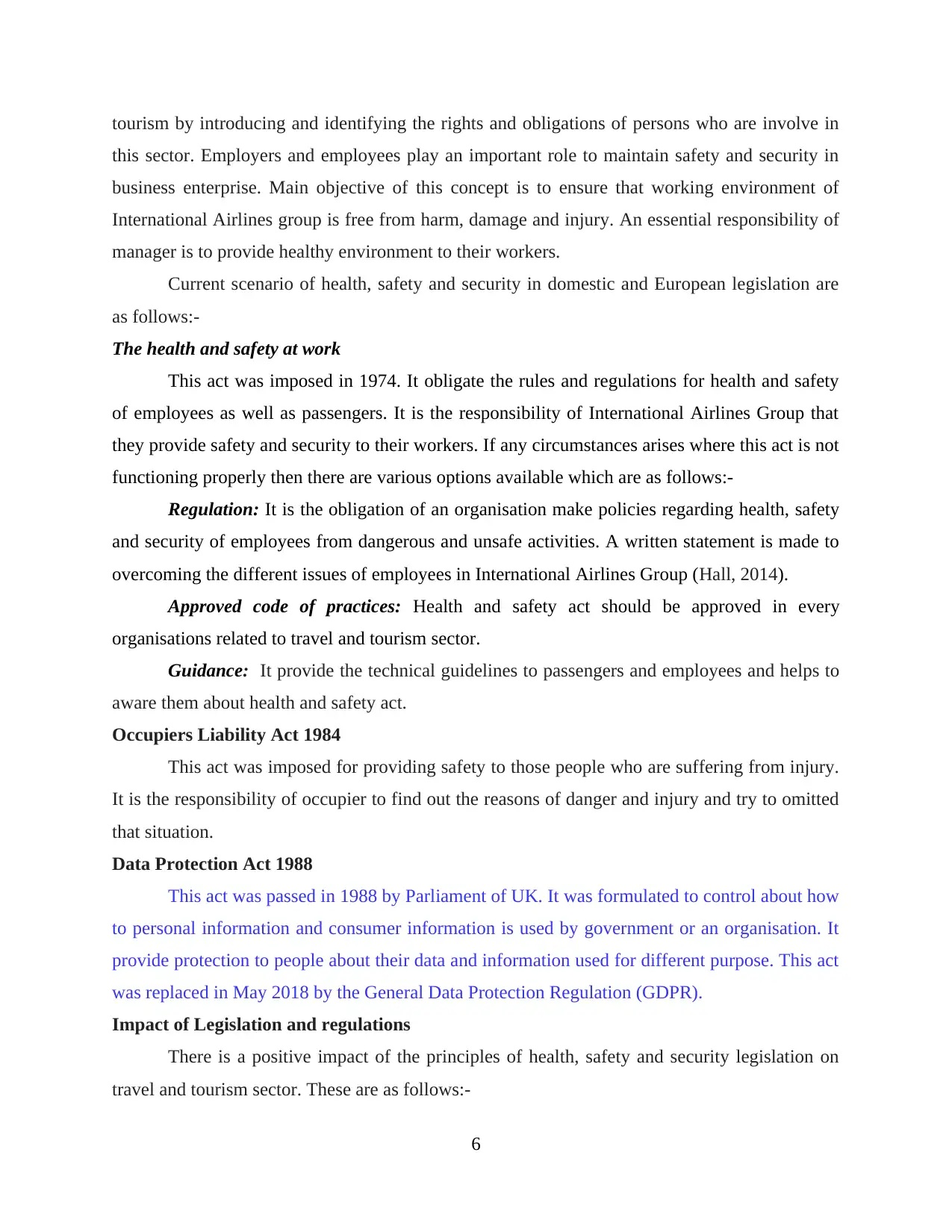
tourism by introducing and identifying the rights and obligations of persons who are involve in
this sector. Employers and employees play an important role to maintain safety and security in
business enterprise. Main objective of this concept is to ensure that working environment of
International Airlines group is free from harm, damage and injury. An essential responsibility of
manager is to provide healthy environment to their workers.
Current scenario of health, safety and security in domestic and European legislation are
as follows:-
The health and safety at work
This act was imposed in 1974. It obligate the rules and regulations for health and safety
of employees as well as passengers. It is the responsibility of International Airlines Group that
they provide safety and security to their workers. If any circumstances arises where this act is not
functioning properly then there are various options available which are as follows:-
Regulation: It is the obligation of an organisation make policies regarding health, safety
and security of employees from dangerous and unsafe activities. A written statement is made to
overcoming the different issues of employees in International Airlines Group (Hall, 2014).
Approved code of practices: Health and safety act should be approved in every
organisations related to travel and tourism sector.
Guidance: It provide the technical guidelines to passengers and employees and helps to
aware them about health and safety act.
Occupiers Liability Act 1984
This act was imposed for providing safety to those people who are suffering from injury.
It is the responsibility of occupier to find out the reasons of danger and injury and try to omitted
that situation.
Data Protection Act 1988
This act was passed in 1988 by Parliament of UK. It was formulated to control about how
to personal information and consumer information is used by government or an organisation. It
provide protection to people about their data and information used for different purpose. This act
was replaced in May 2018 by the General Data Protection Regulation (GDPR).
Impact of Legislation and regulations
There is a positive impact of the principles of health, safety and security legislation on
travel and tourism sector. These are as follows:-
6
this sector. Employers and employees play an important role to maintain safety and security in
business enterprise. Main objective of this concept is to ensure that working environment of
International Airlines group is free from harm, damage and injury. An essential responsibility of
manager is to provide healthy environment to their workers.
Current scenario of health, safety and security in domestic and European legislation are
as follows:-
The health and safety at work
This act was imposed in 1974. It obligate the rules and regulations for health and safety
of employees as well as passengers. It is the responsibility of International Airlines Group that
they provide safety and security to their workers. If any circumstances arises where this act is not
functioning properly then there are various options available which are as follows:-
Regulation: It is the obligation of an organisation make policies regarding health, safety
and security of employees from dangerous and unsafe activities. A written statement is made to
overcoming the different issues of employees in International Airlines Group (Hall, 2014).
Approved code of practices: Health and safety act should be approved in every
organisations related to travel and tourism sector.
Guidance: It provide the technical guidelines to passengers and employees and helps to
aware them about health and safety act.
Occupiers Liability Act 1984
This act was imposed for providing safety to those people who are suffering from injury.
It is the responsibility of occupier to find out the reasons of danger and injury and try to omitted
that situation.
Data Protection Act 1988
This act was passed in 1988 by Parliament of UK. It was formulated to control about how
to personal information and consumer information is used by government or an organisation. It
provide protection to people about their data and information used for different purpose. This act
was replaced in May 2018 by the General Data Protection Regulation (GDPR).
Impact of Legislation and regulations
There is a positive impact of the principles of health, safety and security legislation on
travel and tourism sector. These are as follows:-
6
⊘ This is a preview!⊘
Do you want full access?
Subscribe today to unlock all pages.

Trusted by 1+ million students worldwide
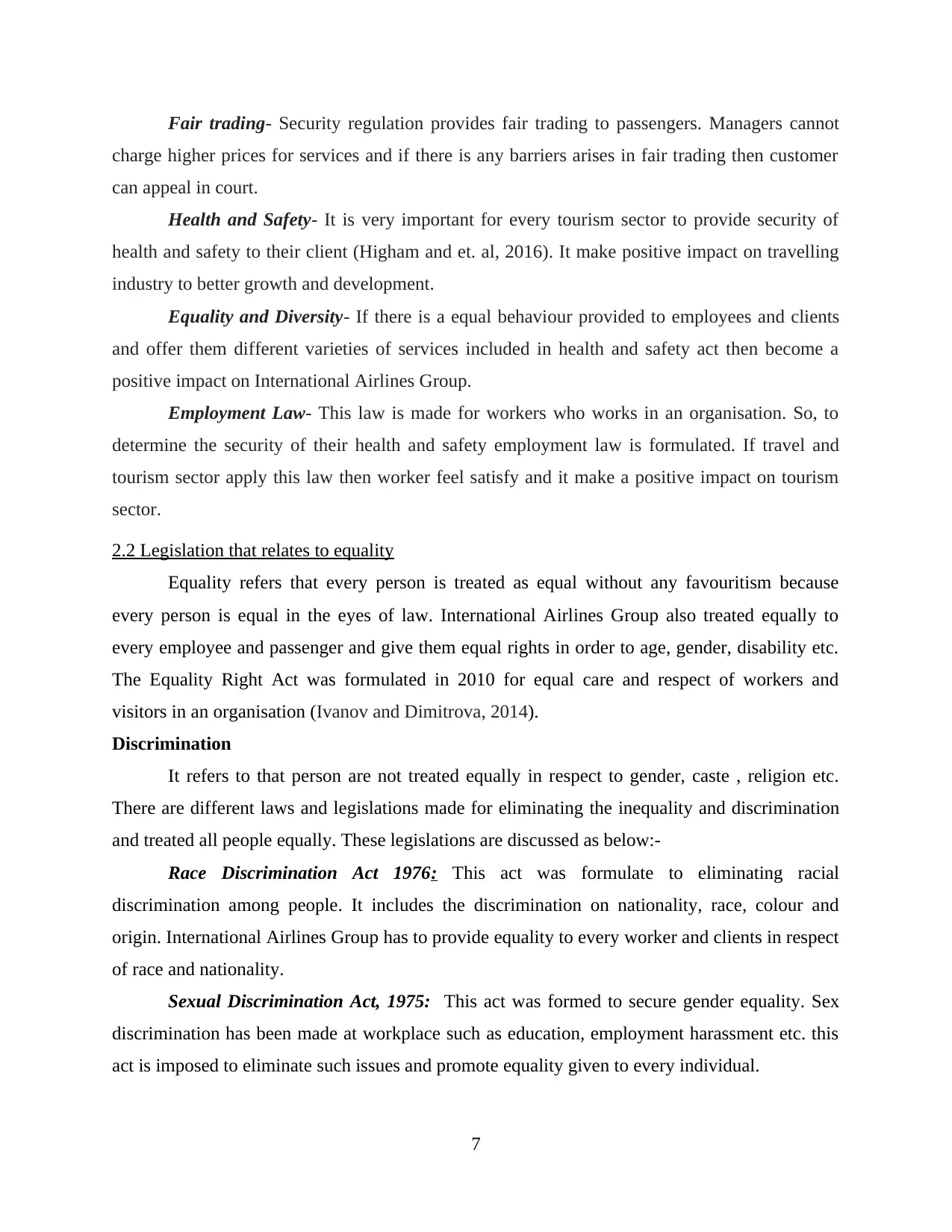
Fair trading- Security regulation provides fair trading to passengers. Managers cannot
charge higher prices for services and if there is any barriers arises in fair trading then customer
can appeal in court.
Health and Safety- It is very important for every tourism sector to provide security of
health and safety to their client (Higham and et. al, 2016). It make positive impact on travelling
industry to better growth and development.
Equality and Diversity- If there is a equal behaviour provided to employees and clients
and offer them different varieties of services included in health and safety act then become a
positive impact on International Airlines Group.
Employment Law- This law is made for workers who works in an organisation. So, to
determine the security of their health and safety employment law is formulated. If travel and
tourism sector apply this law then worker feel satisfy and it make a positive impact on tourism
sector.
2.2 Legislation that relates to equality
Equality refers that every person is treated as equal without any favouritism because
every person is equal in the eyes of law. International Airlines Group also treated equally to
every employee and passenger and give them equal rights in order to age, gender, disability etc.
The Equality Right Act was formulated in 2010 for equal care and respect of workers and
visitors in an organisation (Ivanov and Dimitrova, 2014).
Discrimination
It refers to that person are not treated equally in respect to gender, caste , religion etc.
There are different laws and legislations made for eliminating the inequality and discrimination
and treated all people equally. These legislations are discussed as below:-
Race Discrimination Act 1976: This act was formulate to eliminating racial
discrimination among people. It includes the discrimination on nationality, race, colour and
origin. International Airlines Group has to provide equality to every worker and clients in respect
of race and nationality.
Sexual Discrimination Act, 1975: This act was formed to secure gender equality. Sex
discrimination has been made at workplace such as education, employment harassment etc. this
act is imposed to eliminate such issues and promote equality given to every individual.
7
charge higher prices for services and if there is any barriers arises in fair trading then customer
can appeal in court.
Health and Safety- It is very important for every tourism sector to provide security of
health and safety to their client (Higham and et. al, 2016). It make positive impact on travelling
industry to better growth and development.
Equality and Diversity- If there is a equal behaviour provided to employees and clients
and offer them different varieties of services included in health and safety act then become a
positive impact on International Airlines Group.
Employment Law- This law is made for workers who works in an organisation. So, to
determine the security of their health and safety employment law is formulated. If travel and
tourism sector apply this law then worker feel satisfy and it make a positive impact on tourism
sector.
2.2 Legislation that relates to equality
Equality refers that every person is treated as equal without any favouritism because
every person is equal in the eyes of law. International Airlines Group also treated equally to
every employee and passenger and give them equal rights in order to age, gender, disability etc.
The Equality Right Act was formulated in 2010 for equal care and respect of workers and
visitors in an organisation (Ivanov and Dimitrova, 2014).
Discrimination
It refers to that person are not treated equally in respect to gender, caste , religion etc.
There are different laws and legislations made for eliminating the inequality and discrimination
and treated all people equally. These legislations are discussed as below:-
Race Discrimination Act 1976: This act was formulate to eliminating racial
discrimination among people. It includes the discrimination on nationality, race, colour and
origin. International Airlines Group has to provide equality to every worker and clients in respect
of race and nationality.
Sexual Discrimination Act, 1975: This act was formed to secure gender equality. Sex
discrimination has been made at workplace such as education, employment harassment etc. this
act is imposed to eliminate such issues and promote equality given to every individual.
7
Paraphrase This Document
Need a fresh take? Get an instant paraphrase of this document with our AI Paraphraser
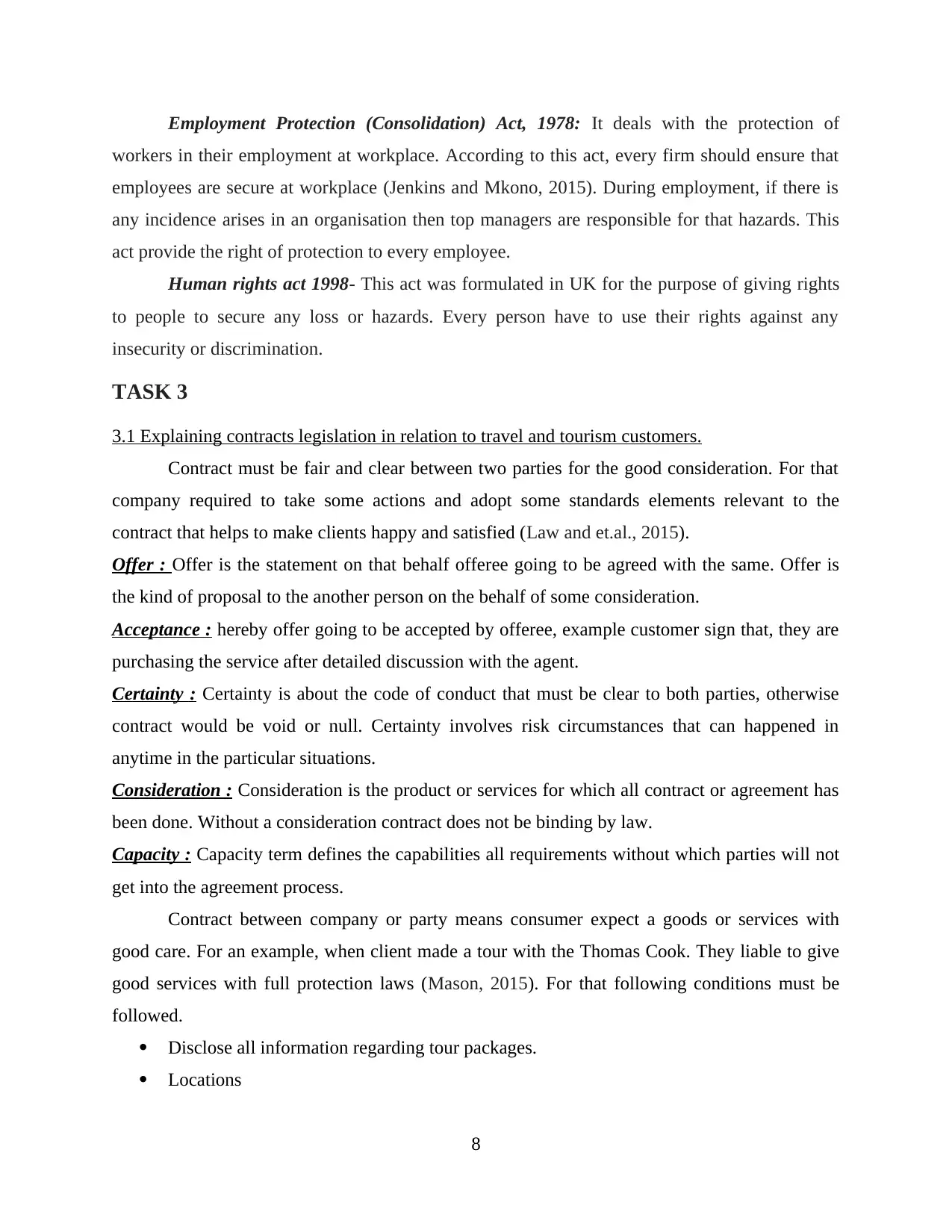
Employment Protection (Consolidation) Act, 1978: It deals with the protection of
workers in their employment at workplace. According to this act, every firm should ensure that
employees are secure at workplace (Jenkins and Mkono, 2015). During employment, if there is
any incidence arises in an organisation then top managers are responsible for that hazards. This
act provide the right of protection to every employee.
Human rights act 1998- This act was formulated in UK for the purpose of giving rights
to people to secure any loss or hazards. Every person have to use their rights against any
insecurity or discrimination.
TASK 3
3.1 Explaining contracts legislation in relation to travel and tourism customers.
Contract must be fair and clear between two parties for the good consideration. For that
company required to take some actions and adopt some standards elements relevant to the
contract that helps to make clients happy and satisfied (Law and et.al., 2015).
Offer : Offer is the statement on that behalf offeree going to be agreed with the same. Offer is
the kind of proposal to the another person on the behalf of some consideration.
Acceptance : hereby offer going to be accepted by offeree, example customer sign that, they are
purchasing the service after detailed discussion with the agent.
Certainty : Certainty is about the code of conduct that must be clear to both parties, otherwise
contract would be void or null. Certainty involves risk circumstances that can happened in
anytime in the particular situations.
Consideration : Consideration is the product or services for which all contract or agreement has
been done. Without a consideration contract does not be binding by law.
Capacity : Capacity term defines the capabilities all requirements without which parties will not
get into the agreement process.
Contract between company or party means consumer expect a goods or services with
good care. For an example, when client made a tour with the Thomas Cook. They liable to give
good services with full protection laws (Mason, 2015). For that following conditions must be
followed.
Disclose all information regarding tour packages.
Locations
8
workers in their employment at workplace. According to this act, every firm should ensure that
employees are secure at workplace (Jenkins and Mkono, 2015). During employment, if there is
any incidence arises in an organisation then top managers are responsible for that hazards. This
act provide the right of protection to every employee.
Human rights act 1998- This act was formulated in UK for the purpose of giving rights
to people to secure any loss or hazards. Every person have to use their rights against any
insecurity or discrimination.
TASK 3
3.1 Explaining contracts legislation in relation to travel and tourism customers.
Contract must be fair and clear between two parties for the good consideration. For that
company required to take some actions and adopt some standards elements relevant to the
contract that helps to make clients happy and satisfied (Law and et.al., 2015).
Offer : Offer is the statement on that behalf offeree going to be agreed with the same. Offer is
the kind of proposal to the another person on the behalf of some consideration.
Acceptance : hereby offer going to be accepted by offeree, example customer sign that, they are
purchasing the service after detailed discussion with the agent.
Certainty : Certainty is about the code of conduct that must be clear to both parties, otherwise
contract would be void or null. Certainty involves risk circumstances that can happened in
anytime in the particular situations.
Consideration : Consideration is the product or services for which all contract or agreement has
been done. Without a consideration contract does not be binding by law.
Capacity : Capacity term defines the capabilities all requirements without which parties will not
get into the agreement process.
Contract between company or party means consumer expect a goods or services with
good care. For an example, when client made a tour with the Thomas Cook. They liable to give
good services with full protection laws (Mason, 2015). For that following conditions must be
followed.
Disclose all information regarding tour packages.
Locations
8
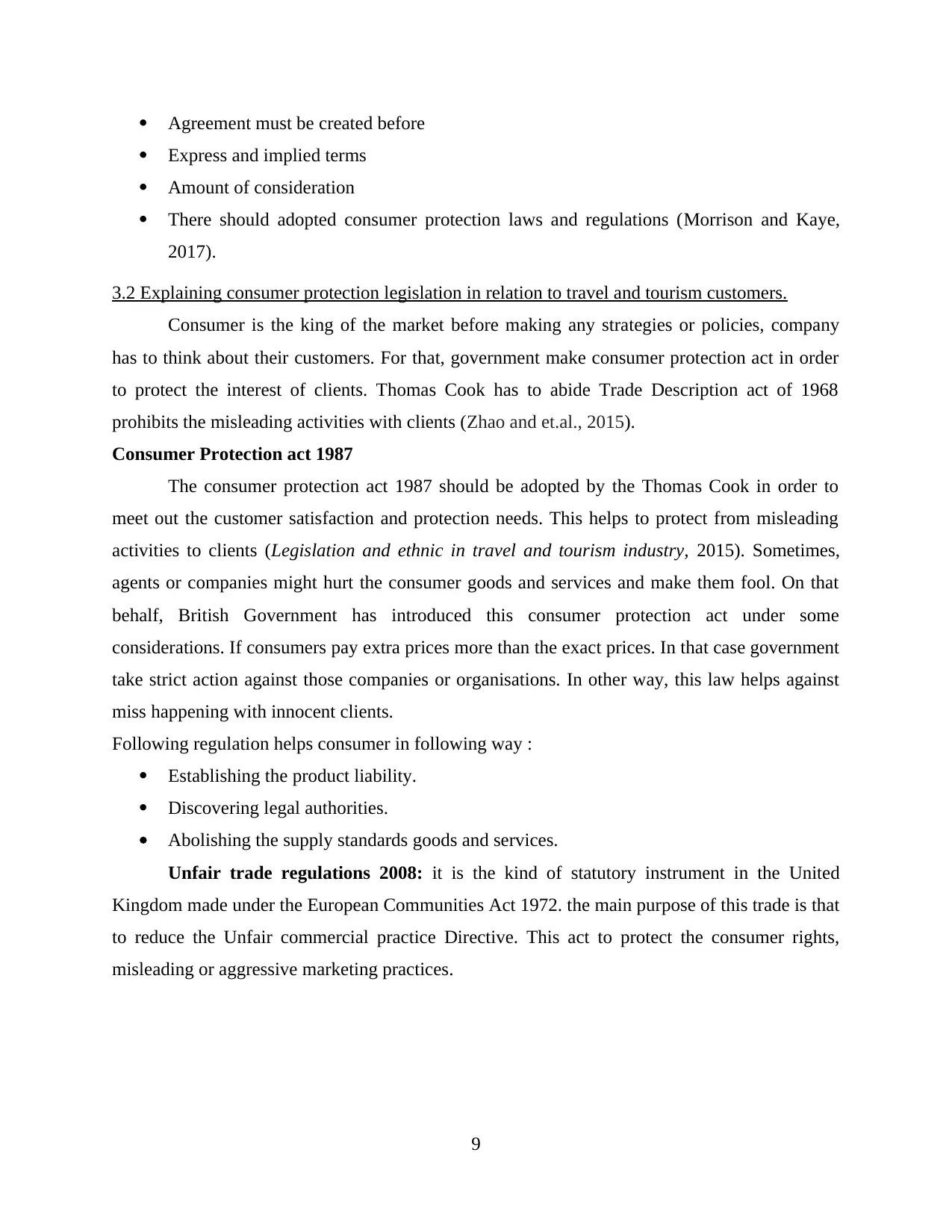
Agreement must be created before
Express and implied terms
Amount of consideration
There should adopted consumer protection laws and regulations (Morrison and Kaye,
2017).
3.2 Explaining consumer protection legislation in relation to travel and tourism customers.
Consumer is the king of the market before making any strategies or policies, company
has to think about their customers. For that, government make consumer protection act in order
to protect the interest of clients. Thomas Cook has to abide Trade Description act of 1968
prohibits the misleading activities with clients (Zhao and et.al., 2015).
Consumer Protection act 1987
The consumer protection act 1987 should be adopted by the Thomas Cook in order to
meet out the customer satisfaction and protection needs. This helps to protect from misleading
activities to clients (Legislation and ethnic in travel and tourism industry, 2015). Sometimes,
agents or companies might hurt the consumer goods and services and make them fool. On that
behalf, British Government has introduced this consumer protection act under some
considerations. If consumers pay extra prices more than the exact prices. In that case government
take strict action against those companies or organisations. In other way, this law helps against
miss happening with innocent clients.
Following regulation helps consumer in following way :
Establishing the product liability.
Discovering legal authorities.
Abolishing the supply standards goods and services.
Unfair trade regulations 2008: it is the kind of statutory instrument in the United
Kingdom made under the European Communities Act 1972. the main purpose of this trade is that
to reduce the Unfair commercial practice Directive. This act to protect the consumer rights,
misleading or aggressive marketing practices.
9
Express and implied terms
Amount of consideration
There should adopted consumer protection laws and regulations (Morrison and Kaye,
2017).
3.2 Explaining consumer protection legislation in relation to travel and tourism customers.
Consumer is the king of the market before making any strategies or policies, company
has to think about their customers. For that, government make consumer protection act in order
to protect the interest of clients. Thomas Cook has to abide Trade Description act of 1968
prohibits the misleading activities with clients (Zhao and et.al., 2015).
Consumer Protection act 1987
The consumer protection act 1987 should be adopted by the Thomas Cook in order to
meet out the customer satisfaction and protection needs. This helps to protect from misleading
activities to clients (Legislation and ethnic in travel and tourism industry, 2015). Sometimes,
agents or companies might hurt the consumer goods and services and make them fool. On that
behalf, British Government has introduced this consumer protection act under some
considerations. If consumers pay extra prices more than the exact prices. In that case government
take strict action against those companies or organisations. In other way, this law helps against
miss happening with innocent clients.
Following regulation helps consumer in following way :
Establishing the product liability.
Discovering legal authorities.
Abolishing the supply standards goods and services.
Unfair trade regulations 2008: it is the kind of statutory instrument in the United
Kingdom made under the European Communities Act 1972. the main purpose of this trade is that
to reduce the Unfair commercial practice Directive. This act to protect the consumer rights,
misleading or aggressive marketing practices.
9
⊘ This is a preview!⊘
Do you want full access?
Subscribe today to unlock all pages.

Trusted by 1+ million students worldwide
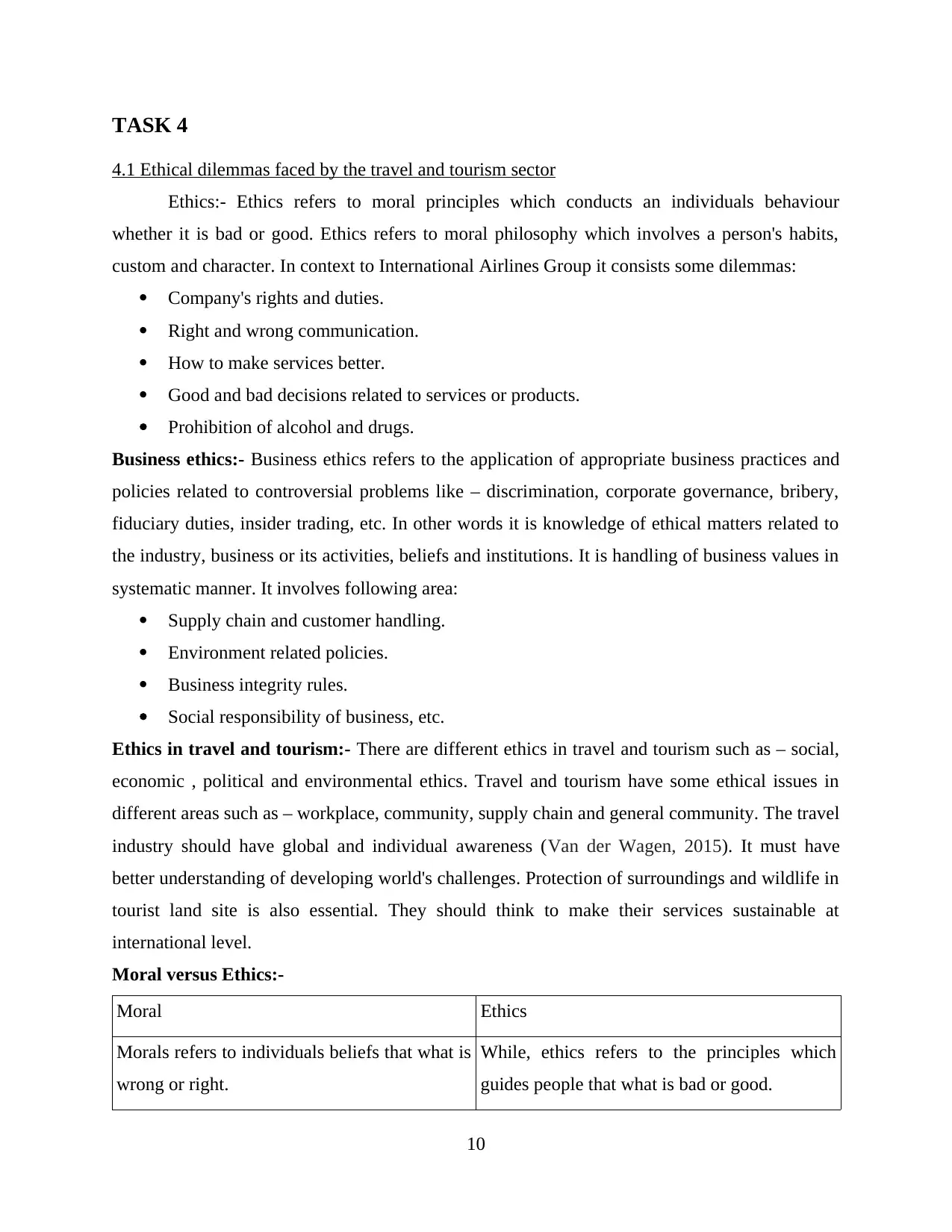
TASK 4
4.1 Ethical dilemmas faced by the travel and tourism sector
Ethics:- Ethics refers to moral principles which conducts an individuals behaviour
whether it is bad or good. Ethics refers to moral philosophy which involves a person's habits,
custom and character. In context to International Airlines Group it consists some dilemmas:
Company's rights and duties.
Right and wrong communication.
How to make services better.
Good and bad decisions related to services or products.
Prohibition of alcohol and drugs.
Business ethics:- Business ethics refers to the application of appropriate business practices and
policies related to controversial problems like – discrimination, corporate governance, bribery,
fiduciary duties, insider trading, etc. In other words it is knowledge of ethical matters related to
the industry, business or its activities, beliefs and institutions. It is handling of business values in
systematic manner. It involves following area:
Supply chain and customer handling.
Environment related policies.
Business integrity rules.
Social responsibility of business, etc.
Ethics in travel and tourism:- There are different ethics in travel and tourism such as – social,
economic , political and environmental ethics. Travel and tourism have some ethical issues in
different areas such as – workplace, community, supply chain and general community. The travel
industry should have global and individual awareness (Van der Wagen, 2015). It must have
better understanding of developing world's challenges. Protection of surroundings and wildlife in
tourist land site is also essential. They should think to make their services sustainable at
international level.
Moral versus Ethics:-
Moral Ethics
Morals refers to individuals beliefs that what is
wrong or right.
While, ethics refers to the principles which
guides people that what is bad or good.
10
4.1 Ethical dilemmas faced by the travel and tourism sector
Ethics:- Ethics refers to moral principles which conducts an individuals behaviour
whether it is bad or good. Ethics refers to moral philosophy which involves a person's habits,
custom and character. In context to International Airlines Group it consists some dilemmas:
Company's rights and duties.
Right and wrong communication.
How to make services better.
Good and bad decisions related to services or products.
Prohibition of alcohol and drugs.
Business ethics:- Business ethics refers to the application of appropriate business practices and
policies related to controversial problems like – discrimination, corporate governance, bribery,
fiduciary duties, insider trading, etc. In other words it is knowledge of ethical matters related to
the industry, business or its activities, beliefs and institutions. It is handling of business values in
systematic manner. It involves following area:
Supply chain and customer handling.
Environment related policies.
Business integrity rules.
Social responsibility of business, etc.
Ethics in travel and tourism:- There are different ethics in travel and tourism such as – social,
economic , political and environmental ethics. Travel and tourism have some ethical issues in
different areas such as – workplace, community, supply chain and general community. The travel
industry should have global and individual awareness (Van der Wagen, 2015). It must have
better understanding of developing world's challenges. Protection of surroundings and wildlife in
tourist land site is also essential. They should think to make their services sustainable at
international level.
Moral versus Ethics:-
Moral Ethics
Morals refers to individuals beliefs that what is
wrong or right.
While, ethics refers to the principles which
guides people that what is bad or good.
10
Paraphrase This Document
Need a fresh take? Get an instant paraphrase of this document with our AI Paraphraser
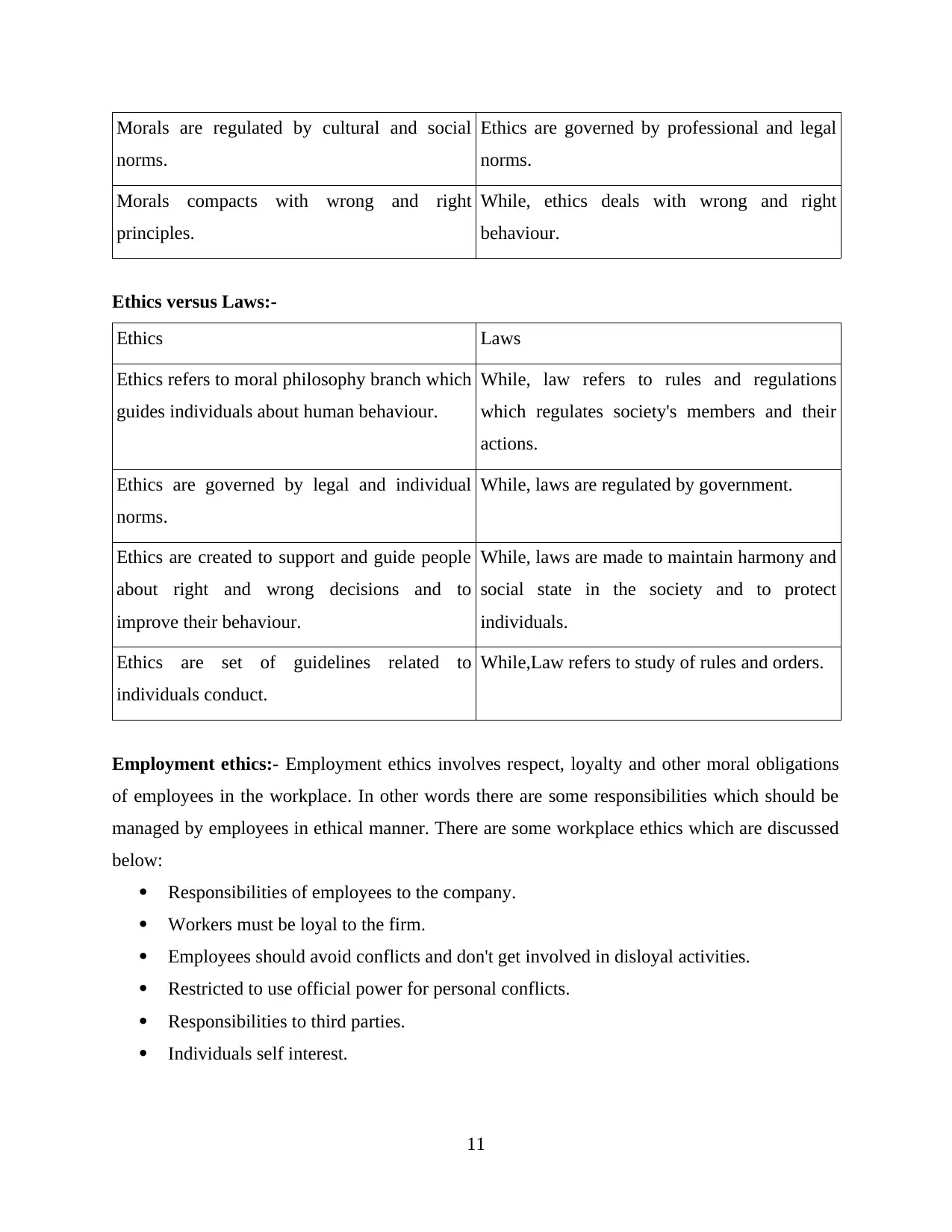
Morals are regulated by cultural and social
norms.
Ethics are governed by professional and legal
norms.
Morals compacts with wrong and right
principles.
While, ethics deals with wrong and right
behaviour.
Ethics versus Laws:-
Ethics Laws
Ethics refers to moral philosophy branch which
guides individuals about human behaviour.
While, law refers to rules and regulations
which regulates society's members and their
actions.
Ethics are governed by legal and individual
norms.
While, laws are regulated by government.
Ethics are created to support and guide people
about right and wrong decisions and to
improve their behaviour.
While, laws are made to maintain harmony and
social state in the society and to protect
individuals.
Ethics are set of guidelines related to
individuals conduct.
While,Law refers to study of rules and orders.
Employment ethics:- Employment ethics involves respect, loyalty and other moral obligations
of employees in the workplace. In other words there are some responsibilities which should be
managed by employees in ethical manner. There are some workplace ethics which are discussed
below:
Responsibilities of employees to the company.
Workers must be loyal to the firm.
Employees should avoid conflicts and don't get involved in disloyal activities.
Restricted to use official power for personal conflicts.
Responsibilities to third parties.
Individuals self interest.
11
norms.
Ethics are governed by professional and legal
norms.
Morals compacts with wrong and right
principles.
While, ethics deals with wrong and right
behaviour.
Ethics versus Laws:-
Ethics Laws
Ethics refers to moral philosophy branch which
guides individuals about human behaviour.
While, law refers to rules and regulations
which regulates society's members and their
actions.
Ethics are governed by legal and individual
norms.
While, laws are regulated by government.
Ethics are created to support and guide people
about right and wrong decisions and to
improve their behaviour.
While, laws are made to maintain harmony and
social state in the society and to protect
individuals.
Ethics are set of guidelines related to
individuals conduct.
While,Law refers to study of rules and orders.
Employment ethics:- Employment ethics involves respect, loyalty and other moral obligations
of employees in the workplace. In other words there are some responsibilities which should be
managed by employees in ethical manner. There are some workplace ethics which are discussed
below:
Responsibilities of employees to the company.
Workers must be loyal to the firm.
Employees should avoid conflicts and don't get involved in disloyal activities.
Restricted to use official power for personal conflicts.
Responsibilities to third parties.
Individuals self interest.
11
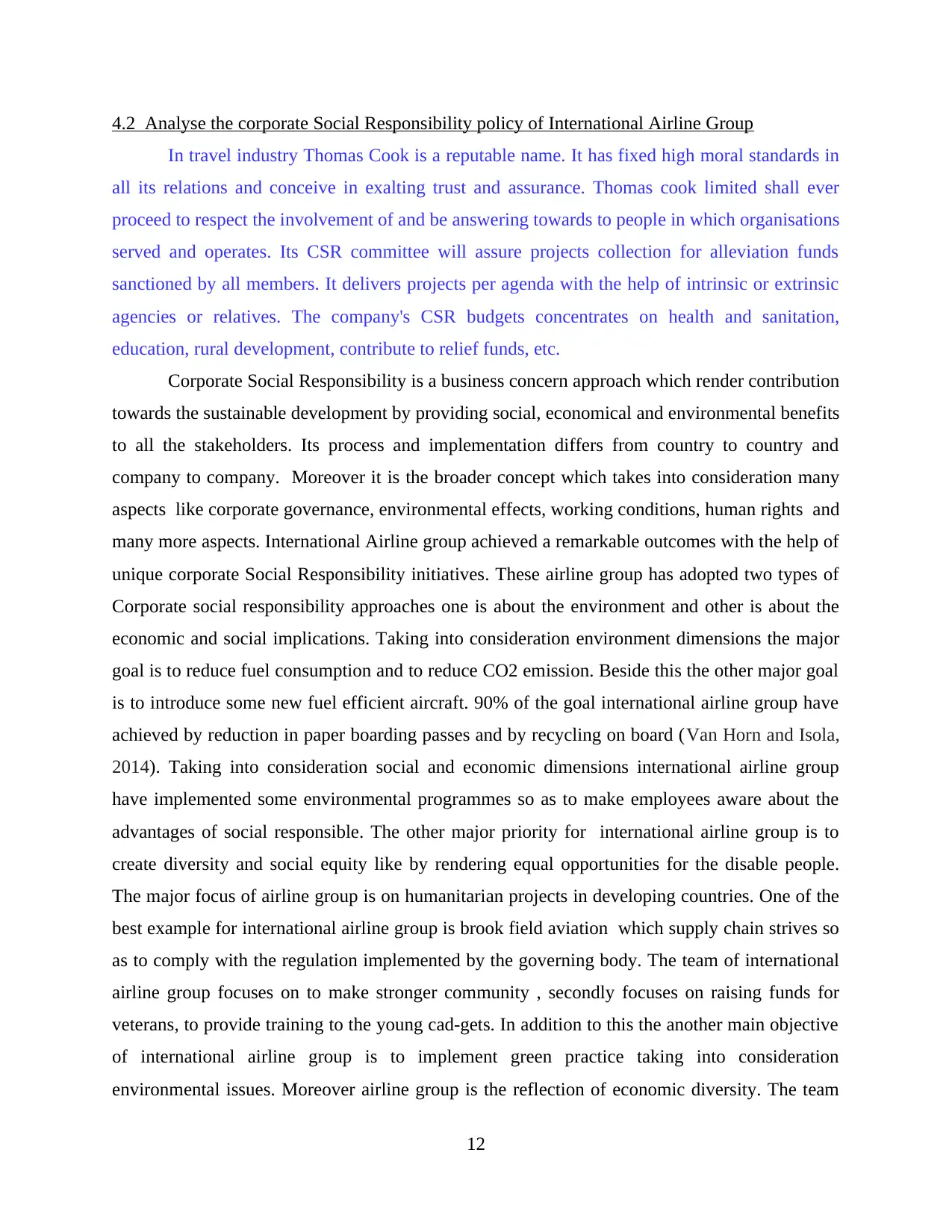
4.2 Analyse the corporate Social Responsibility policy of International Airline Group
In travel industry Thomas Cook is a reputable name. It has fixed high moral standards in
all its relations and conceive in exalting trust and assurance. Thomas cook limited shall ever
proceed to respect the involvement of and be answering towards to people in which organisations
served and operates. Its CSR committee will assure projects collection for alleviation funds
sanctioned by all members. It delivers projects per agenda with the help of intrinsic or extrinsic
agencies or relatives. The company's CSR budgets concentrates on health and sanitation,
education, rural development, contribute to relief funds, etc.
Corporate Social Responsibility is a business concern approach which render contribution
towards the sustainable development by providing social, economical and environmental benefits
to all the stakeholders. Its process and implementation differs from country to country and
company to company. Moreover it is the broader concept which takes into consideration many
aspects like corporate governance, environmental effects, working conditions, human rights and
many more aspects. International Airline group achieved a remarkable outcomes with the help of
unique corporate Social Responsibility initiatives. These airline group has adopted two types of
Corporate social responsibility approaches one is about the environment and other is about the
economic and social implications. Taking into consideration environment dimensions the major
goal is to reduce fuel consumption and to reduce CO2 emission. Beside this the other major goal
is to introduce some new fuel efficient aircraft. 90% of the goal international airline group have
achieved by reduction in paper boarding passes and by recycling on board (Van Horn and Isola,
2014). Taking into consideration social and economic dimensions international airline group
have implemented some environmental programmes so as to make employees aware about the
advantages of social responsible. The other major priority for international airline group is to
create diversity and social equity like by rendering equal opportunities for the disable people.
The major focus of airline group is on humanitarian projects in developing countries. One of the
best example for international airline group is brook field aviation which supply chain strives so
as to comply with the regulation implemented by the governing body. The team of international
airline group focuses on to make stronger community , secondly focuses on raising funds for
veterans, to provide training to the young cad-gets. In addition to this the another main objective
of international airline group is to implement green practice taking into consideration
environmental issues. Moreover airline group is the reflection of economic diversity. The team
12
In travel industry Thomas Cook is a reputable name. It has fixed high moral standards in
all its relations and conceive in exalting trust and assurance. Thomas cook limited shall ever
proceed to respect the involvement of and be answering towards to people in which organisations
served and operates. Its CSR committee will assure projects collection for alleviation funds
sanctioned by all members. It delivers projects per agenda with the help of intrinsic or extrinsic
agencies or relatives. The company's CSR budgets concentrates on health and sanitation,
education, rural development, contribute to relief funds, etc.
Corporate Social Responsibility is a business concern approach which render contribution
towards the sustainable development by providing social, economical and environmental benefits
to all the stakeholders. Its process and implementation differs from country to country and
company to company. Moreover it is the broader concept which takes into consideration many
aspects like corporate governance, environmental effects, working conditions, human rights and
many more aspects. International Airline group achieved a remarkable outcomes with the help of
unique corporate Social Responsibility initiatives. These airline group has adopted two types of
Corporate social responsibility approaches one is about the environment and other is about the
economic and social implications. Taking into consideration environment dimensions the major
goal is to reduce fuel consumption and to reduce CO2 emission. Beside this the other major goal
is to introduce some new fuel efficient aircraft. 90% of the goal international airline group have
achieved by reduction in paper boarding passes and by recycling on board (Van Horn and Isola,
2014). Taking into consideration social and economic dimensions international airline group
have implemented some environmental programmes so as to make employees aware about the
advantages of social responsible. The other major priority for international airline group is to
create diversity and social equity like by rendering equal opportunities for the disable people.
The major focus of airline group is on humanitarian projects in developing countries. One of the
best example for international airline group is brook field aviation which supply chain strives so
as to comply with the regulation implemented by the governing body. The team of international
airline group focuses on to make stronger community , secondly focuses on raising funds for
veterans, to provide training to the young cad-gets. In addition to this the another main objective
of international airline group is to implement green practice taking into consideration
environmental issues. Moreover airline group is the reflection of economic diversity. The team
12
⊘ This is a preview!⊘
Do you want full access?
Subscribe today to unlock all pages.

Trusted by 1+ million students worldwide
1 out of 15
Related Documents
Your All-in-One AI-Powered Toolkit for Academic Success.
+13062052269
info@desklib.com
Available 24*7 on WhatsApp / Email
![[object Object]](/_next/static/media/star-bottom.7253800d.svg)
Unlock your academic potential
Copyright © 2020–2026 A2Z Services. All Rights Reserved. Developed and managed by ZUCOL.




